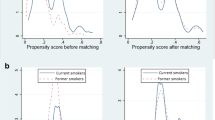Abstract
This study examined the long-term stability of Type A behavior pattern in the Western Collaborative Group Study for 1180 surviving participants in a 27-year follow-up examination during 1986–1987. Subjects were readministered the Structured Interview (SI), originally developed for this study and first administered at intake in 1960–1961. Subjects were also given the Jenkins Activity Survey (JAS) and were asked to evaluate their behaviors currently and in the past using two short descriptions of Type A and Type B behaviors. Analyses of changes in global SI ratings, JAS score, and self-ratings showed no relationships between self-perceived changes reported in questionnaires and observed changes when assessed by the SI. Using the SI ratings, 61% of subjects retained their initial classification and 39% of subjects were rated differently, with a higher percentage of those originally typed B being rerated as A than A being rerated as B. Type B subjects rerated as A were significantly younger, retired earlier, reported better health, and were less likely to have been in a managerial or professional position than the subjects who changed from A to B.
Similar content being viewed by others
References
Byrne, D. G., Rosenman, R. H., Schiller, E., and Chesney, M. A. (1985). Consistency and variation among instruments purporting to measure the Type A behavior pattern.Psychosom. Med. 47: 242–261.
Carmelli, D., Rosenman, R. H., and Chesney, M. A. (1987). Stability of the Type A Structured Interview and related questionnaires in a 10-year follow-up of an adult cohort of twins.J. Behav. Med. 10: 513–525.
Carmelli, D., Halpern, J., Swan, G. E., Dame, A., McElroy, M., Gelb, A. B., and Rosenman, R. H. (1991). 27-year mortality in the WCGS: Construction of risk groups by recursive portitioning.J. Clin. Epidemiol. (in press).
Criqui, M. H., Frankville, D. D., Barrett-Connor, E., Klauber, M. R., Holdbrook, M. J., and Turner, J. D. (1983). Change and correlates of change in high and low density lipoprotein cholesterol after six years: A prospective study.Am. J. Epidemiol. 118: 52–59.
Dimsdale, J. E. (1988). A perspective on Type A behavior and coronary disease.N. Engl. J. Med. 318: 110–112.
Evans, G. W., Palsone, M. N., and Correre, S. (1987). Type A behavior and occupational stress: A cross-cultural study of blue-collar workers.J. Personal. Soc. Psychol. 36: 1213–1220.
Fleiss, J. L. (1981).Statistical Methods for Rates and Proportions, 2nd ed., J. Wiley and Sons, New York, pp. 212–225.
Haynes, S. C., and Matthews, K. A. (1988). The association of Type A behavior with cardiovascular disease: Update and critical review. In Houston, B. K., and Snyder, C. R. (eds.),Type A Behavior Pattern: Research, Theory, and Intervention, J. Wiley and Sons, New York.
Jenkins, C. D., Zyzanksi, S. J., and Rosenman, R. H. (1979).Jenkins Activity Survey Manual, Psychological Corp., New York.
Matarazzo, J. D., and Wiens, A. N. (1972).The Interview: Research on Its Anatomy and Structure, Aldine-Atherton, Chicago.
Matthews, K. A. (1982). Psychological perspectives on the Type A behavior pattern.Psychol. Bull. 91: 293–323.
Moss, G. E., Dielman, T. E., Campanelli, P. C., Leech, S. L., Harlan, W. R., Harrison, R. V., and Horvath, W. J. (1986). Demographic correlates of SI assessments of Type A behavior.Psychosom. Med. 48: 564–574.
O'Rourke, D. F., Houston, B. K., and Harris, J. K. (1988). The Type A behavior pattern: Summary, conclusions, and implications. In Houston, B. K., and Snyder, C. R. (eds.),Type A Behavior Pattern: Research, Theory, and Intervention, J. Wiley and Sons, New York.
Prentice, R. L., Shimizy, Y., Lin, C. H., Peterson, A. V., Kato, H., Mason, M. W., and Zatrowski, T. P. (1982). Serial blood pressure measurements and cardiovascular disease in a Japanese cohort.Am. J. Epidemiol. 116: 1–28.
Ragland, D. R., and Brand, R. J. (1988a). Type A behavior and mortality from coronary heart disease.N. Engl. J. Med. 318: 65–69.
Ragland, D. R., and Brand, R. J. (1988b). Coronary heart disease mortality in the WCGS: Follow-up experience of 22 years.Am. J. Epidemiol. 127: 462–475.
Rosenman, R. H. (1978). The interview method of assessment of the coronary-prone behavior pattern. In Dembroski, T. M., Weiss, S. M., Shields, J. G., Haynes, S., and Feinleib, M. (eds.),Coronary-Prone Behavior, Springer-Verlag, New York.
Rosenman, R. H., Friedman, M., Straus, R., Wurm, M., Kositchek, R., and Werthessen, N. T. (1964). A predictive study of coronary heart disease: The Western Collaborative Group Study.JAMA 189: 15–22.
Scherwitz, L. (1988). Interviewer behaviors in the WCGS and the Multiple Risk Factor Intervention Trial structured interview. In Houston, B. K., and Snyder, C. R. (eds.),Type A Behavior Pattern: Research, Theory, and Intervention, J. Wiley and Sons, New York.
Swan, G. E., Dame, A., and Carmelli, D. (1991). Type A behavior, involuntary retirement, and current functioning in elderly men: 27 year follow-up of the Western Collaborative Group Study (1991).Psychol. Aging 6: 384–391.
Author information
Authors and Affiliations
Rights and permissions
About this article
Cite this article
Carmelli, D., Dame, A., Swan, G. et al. Long-term changes in Type A behavior: A 27-year follow-up of the Western Collaborative Group Study. J Behav Med 14, 593–606 (1991). https://doi.org/10.1007/BF00867173
Accepted:
Issue Date:
DOI: https://doi.org/10.1007/BF00867173




